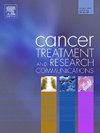A systematic literature review of MTAP deletions in solid and hematologic Cancers
IF 2.4
Q3 Medicine
引用次数: 0
Abstract
Background
Methylthioadenosine phosphorylase (MTAP) deficiency is observed across multiple cancers and represents an emerging biomarker with therapeutic potential via synthetic lethality with PRMT5 inhibition. This systematic literature review summarizes the prevalence of MTAP deletions or loss of expression and prognostic impacts of MTAP deletions or loss in adult and pediatric patients with specific solid or hematologic cancers.
Methods
Following PRISMA methodology, the literature on MTAP deletion or loss in multiple cancer types was reviewed. Prevalence, laboratory testing methods, patient characteristics, and clinical outcomes according to MTAP status were synthesized. Study quality was determined using standard tools.
Results
Of the 352 identified studies, 37 reported on MTAP. The majority were retrospective cohorts (N=32; 86%). The most common laboratory test type was NGS, specifically FoundationOne (N=7, 24%). MTAP deletion (loss) prevalence varied across tumor types and were generally lowest in gastric cancer (4%–14%) and highest in glioblastoma (26%–60%). MTAP deletion was correlated with higher prevalence of KRAS. Variation by age, gender, and race/ethnicity were inconsistently reported. Survival outcomes were reported most often for GBM and NSCLC with some studies suggesting worse overall survival among patients with MTAP deletions, although the evidence was heterogeneous.
Conclusion
This is the first systematic review to summarize the literature on MTAP deletions or loss of expression across several solid and hematologic cancers. MTAP deletions and/or loss of expression occur in many cancer types, presenting a promising target for pan-cancer therapy.
MTAP缺失在实体癌和血液病中的系统文献综述
甲基硫代腺苷磷酸化酶(MTAP)缺乏症在多种癌症中被观察到,是一种新兴的生物标志物,通过抑制PRMT5的合成致死性具有治疗潜力。本系统的文献综述总结了MTAP缺失或表达缺失的患病率以及MTAP缺失或表达缺失对成人和儿童特异性实体癌或血液病患者预后的影响。方法采用PRISMA方法,对多种癌症中MTAP缺失或缺失的相关文献进行综述。根据MTAP状态综合患病率、实验室检测方法、患者特征和临床结果。使用标准工具确定研究质量。结果352项研究中,37项报告了MTAP。大多数为回顾性队列(N=32;86%)。最常见的实验室检测类型是NGS,特别是FoundationOne (N=7, 24%)。MTAP缺失(丢失)的患病率因肿瘤类型而异,通常在胃癌中最低(4%-14%),在胶质母细胞瘤中最高(26%-60%)。MTAP缺失与KRAS患病率升高相关。不同年龄、性别和种族/民族的差异报告不一致。生存结果最常被报道为GBM和NSCLC,一些研究表明MTAP缺失患者的总生存率较差,尽管证据是不一致的。结论:本文首次系统综述了几种实体癌和血液病中MTAP缺失或表达缺失的文献。MTAP缺失和/或表达缺失发生在许多癌症类型中,为泛癌症治疗提供了一个有希望的靶点。
本文章由计算机程序翻译,如有差异,请以英文原文为准。
求助全文
约1分钟内获得全文
求助全文
来源期刊

Cancer treatment and research communications
Medicine-Oncology
CiteScore
4.30
自引率
0.00%
发文量
148
审稿时长
56 days
期刊介绍:
Cancer Treatment and Research Communications is an international peer-reviewed publication dedicated to providing comprehensive basic, translational, and clinical oncology research. The journal is devoted to articles on detection, diagnosis, prevention, policy, and treatment of cancer and provides a global forum for the nurturing and development of future generations of oncology scientists. Cancer Treatment and Research Communications publishes comprehensive reviews and original studies describing various aspects of basic through clinical research of all tumor types. The journal also accepts clinical studies in oncology, with an emphasis on prospective early phase clinical trials. Specific areas of interest include basic, translational, and clinical research and mechanistic approaches; cancer biology; molecular carcinogenesis; genetics and genomics; stem cell and developmental biology; immunology; molecular and cellular oncology; systems biology; drug sensitivity and resistance; gene and antisense therapy; pathology, markers, and prognostic indicators; chemoprevention strategies; multimodality therapy; cancer policy; and integration of various approaches. Our mission is to be the premier source of relevant information through promoting excellence in research and facilitating the timely translation of that science to health care and clinical practice.
 求助内容:
求助内容: 应助结果提醒方式:
应助结果提醒方式:


